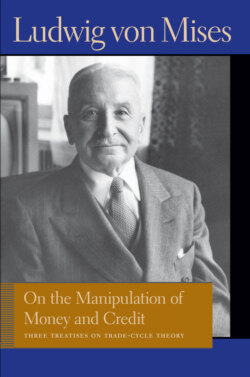Читать книгу On the Manipulation of Money and Credit - Людвиг фон Мизес - Страница 24
На сайте Литреса книга снята с продажи.
4. The Alternatives
ОглавлениеThese various means, however, are the only ways by which the reparations obligations can be met. Goods or capital, which would otherwise have been consumed within the country, can be exported. To discuss which is more practical is not the task of this essay. The only question which concerns us is how the government can proceed in order to shift to the individual citizens the burden of payments, which devolves first of all on the German treasury. Three ways are possible: raising taxes; borrowing within the country; and issuing paper money. Whichever one of the three methods may be chosen, the nature of its effect abroad remains unaltered. These three ways differ only in their distribution of the burden among citizens.
If the funds are collected by raising a domestic loan, then subscribers to the loan must either reduce their consumption or dispose of a part of their capital. If taxes are imposed, then the taxpayers must do the same. The funds which flow from taxes or loans into the government treasury and which it uses to buy gold, foreign bills of exchange, and foreign currencies to fulfill its foreign liabilities are supplied by the lenders and the taxpayers through the sale abroad of commodities and capital goods. The government can only purchase available foreign exchange which comes into the country from these sales. So long as the government has the power to distribute only those funds which it receives from tax payments and the floating of loans, its purchases of foreign exchange cannot push up the price of gold and foreign currencies. At any one time, the government can buy only so much gold and foreign exchange as the citizens have acquired through export sales. In fact, the world prices of goods and services cannot rise on this account. Rather their prices will decline as a consequence of the larger quantities offered for sale.
However, if and as the government follows the third route, issuing new notes in order to buy gold and foreign exchange instead of raising taxes and floating loans, then its demand for gold and foreign exchange, which is obviously not counterbalanced by a proportionate supply, drives up the prices of various kinds of foreign money. It then becomes advantageous for foreigners to acquire more marks so as to buy capital goods and commodities within Germany at prices which do not yet reflect the new ratios. These purchases drive prices up in Germany right away and bring them once again into adjustment with the world market. This is the actual situation. The foreign exchange, with which reparations obligations are paid, comes from sales abroad of German capital and commodities. The only difference consists in how the government obtains the foreign exchange. In this case, the government first buys the foreign exchange abroad with marks, which the foreigners then use to make purchases in Germany, rather than the German government’s acquiring the foreign exchange from those within Germany who have received payment for previous sales abroad.
From this one learns that the continuing depreciation of the German mark cannot be the consequence of reparations payments. The depreciation of the mark is simply a result of the fact that the government supplies the funds needed for the payments through new issues of notes. Even those who wish to attribute the decline in the rate of exchange on the market to the payment of reparations, rather than to inflation, point out that the quotation for marks is inevitably disturbed by the government’s offering of marks for the purchase of foreign exchange.3 Still, if the government had available for these foreign exchange purchases only the number of marks which it received from taxes or loans, then its demand would not exceed the supply. It is only because it is offering newly created notes that it drives the foreign exchange rates up.
